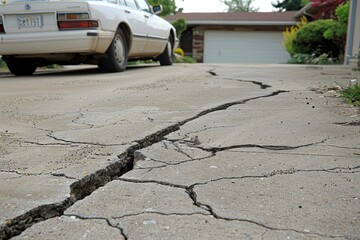In this guide, we aim to equip you with the necessary information and tips to successfully install a concrete driveway in Ann Arbor, MI.
We will delve into the local regulations that may impact your project, help you select the most suitable contractor, discuss the weather implications on your chosen materials, and underline the importance of diligent maintenance post-installation.
Ready to dive deeper? Read on for a more comprehensive look at what you need to know.
Understanding Ann Arbor’s Local Regulations
Before you break ground on your concrete driveway project in Ann Arbor, it’s essential to understand the local regulations.
These rules are in place for a good reason:
Obtaining a Building Permit:
- Importance: A building permit ensures your project complies with local building codes and safety standards.
- Process:
Visit the Ann Arbor City Building Department: You can typically apply in person or online.
Submit a detailed application: This will require information such as:
Driveway dimensions
Location of the property
Materials
Drainage plan
Pay applicable fees: The permit fee will vary depending on the size and complexity of your project.
Checking Zoning Regulations:
- Importance: Zoning laws dictate what types of structures can be built where and how they can be used.
- How to find the information:
Consult the Ann Arbor City Zoning Ordinance: This document outlines all zoning regulations.
Use the city’s online mapping tools: These tools can help you determine the zoning classification of your property.
Visit or contact the Ann Arbor Planning Department: Staff can provide guidance and answer any questions you may have.
- Key Zoning Considerations:
Setbacks: Minimum distances required between the driveway and property lines.
Driveway width limits: Restrictions on how wide the driveway can be.
Permitted uses: Ensure the driveway is consistent with the zoning classification of your property.
Complying with Stormwater Regulations:
- Importance: Stormwater runoff from driveways can contribute to erosion, pollution, and flooding.
- Requirements:
- Implement proper drainage solutions: This may include:
- Grading: Sloping the driveway to direct water away from the house and towards a designated drainage area.
- Curbs and gutters: To channel water into the street or a designated drainage system.
- Infiltration trenches or rain gardens: To allow rainwater to soak into the ground.
- Consider permeable paving materials: Options like permeable concrete or porous asphalt allow some water to seep through.
- Implement proper drainage solutions: This may include:
Other Important Considerations:
- Homeowners Association (HOA) Rules: If you live in a subdivision with an HOA, review their rules regarding driveway construction.
- Landscaping: Plan how the driveway will integrate with your existing landscaping and overall property aesthetics.
- Accessibility: If you or anyone in your household has disabilities, ensure the driveway design complies with accessibility standards.
- Professional Installation: Hiring a qualified and experienced concrete contractor is highly recommended for a quality and long-lasting driveway.
Choosing the Right Contractor
In Ann Arbor, you have access to a variety of contractors, but careful research is crucial to ensure you choose the best fit.
Verify Licensing and Insurance:
- Licensing:
Ensure the contractor is properly licensed by the State of Michigan.
- Insurance:
Liability insurance protects you from potential legal and financial liabilities in case of accidents or property damage during construction.
Assess Experience and Local Knowledge:
Preparation: Proper excavation, grading, and base preparation are crucial for a long-lasting driveway.
Concrete Placement: Techniques for achieving a smooth, even, and durable surface, considering factors like proper slump, vibration, and finishing.
Finishing: Expertise in finishing techniques, such as broom finishing, troweling, and adding decorative elements like stamped concrete or exposed aggregate.
- Ann Arbor Specific Knowledge:
Climate: Understanding of Ann Arbor’s climate and how it affects concrete (e.g., freeze-thaw cycles, seasonal temperature variations).
Local Regulations: Familiarity with Ann Arbor’s building codes, zoning regulations, and stormwater ordinances.
Obtain References and Check Reviews:
- Request References: Ask for a list of recent clients and contact them to inquire about their experience with the contractor.
- Online Reviews:
Look for reviews that are detailed and specific, mentioning the contractor’s professionalism, communication, quality of work, attention to detail, and responsiveness to concerns.
Weather Considerations for Concrete Driveways
Weather plays a critical role in the success of a concrete driveway project, especially in a climate like Ann Arbor’s with its distinct seasons.
Ideal Temperature Range:
- Optimal Temperature: 50°F to 60°F is generally considered the ideal temperature range for concrete placement.
Within this range, the concrete cures at a moderate pace.
- Cold Weather Concerns:
Freezing Temperatures: Temperatures below 40°F can significantly slow down the curing process.
Freezing temperatures can cause the water within the concrete to freeze and expand.
- Hot Weather Concerns:
Rapid Drying: High temperatures can cause the concrete to dry too quickly, leading to rapid moisture loss and potential cracking.
Direct Sunlight: Direct sunlight can accelerate drying and exacerbate the risk of surface cracking.
Rain and Moisture:
- Rain During Placement: Rain can wash away cement, weaken the concrete, and create surface imperfections.
After installation, maintaining your concrete driveway is crucial to prolong its longevity and keep it looking its best.
Regular cleaning, sealing every few years, and addressing minor damages promptly can prevent more significant problems in the future.
In Ann Arbor’s winter, avoid using harmful de-icing chemicals and use appropriate snow removal tools to prevent damage.
Regularly check for cracks, especially after the freeze-thaw cycles, and get them repaired promptly to prevent further deterioration.
By following these steps, you’ll ensure your concrete driveway remains a valuable and attractive feature of your property for many years.


Recent Comments